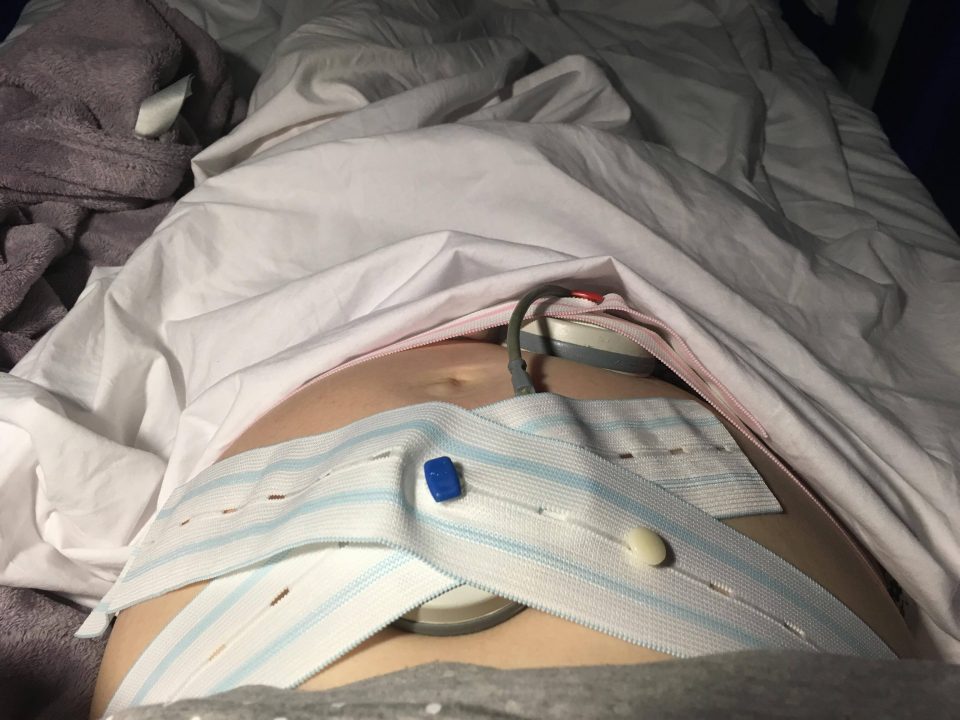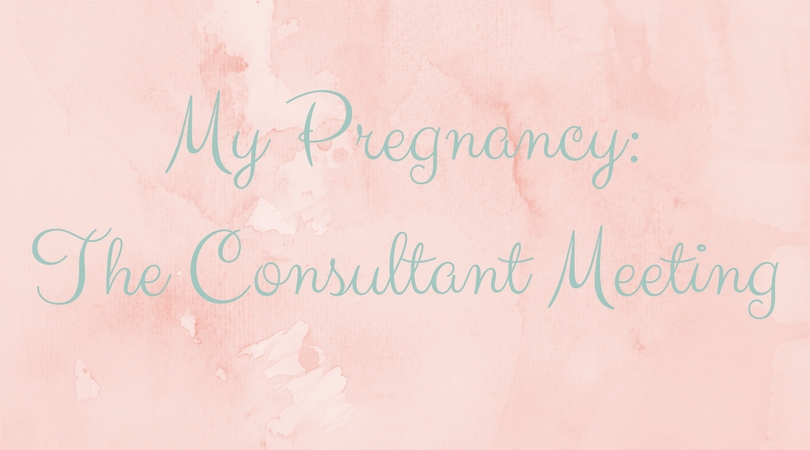
What To Expect If Your Waters Break Early

At 30 weeks pregnant, the last thing I expected to happen was to have my waters breaking this early. The pregnancy has been a little up and down due to the presence of Group B Strep but as this was known about and I was monitoring myself for any changes I just assumed everything would be ok up until my due date.
I first felt something at around 7pm but as I hadn’t experienced my waters breaking during my first labour I just assumed that I’d had a little urine leakage… just an oops moment! However, ten minutes later and I felt the same thing.
I spoke to my hubby about it and he started to look up waters breaking early on the internet but we weren’t convinced as there wasn’t very much fluid and I was only 30 weeks gone. Plus there’s always that idea in the back of your mind that as soon as your waters break there is a huge gush, that it only happens once and that contractions follow this – films have a lot to answer for! However, At 2:30am I woke in bed, soaking wet. I knew this had to, in fact, be my waters breaking early, and I began to mentally prepare myself for impending early labour.
After a phone call to the labourline they were pretty certain that my symptoms were my waters rupturing and they worked quickly to find a hospital for me to get to… only trouble was that if my baby was to come at that moment he would be 10 weeks premature and they would need to find a hospital with the space and the equipment as he would need urgent aftercare. With hospitals in this area bursting at the seams we had a bit of a wait to find out where we were going to have to go. thankfully, a couple of hours later we were finally given the go-ahead to go to our local one.
From here things can feel very surreal, confusing, emotional and you are of course shattered from overthinking but, in most cases, if labour hasn’t started, this is what will take place once you are admitted…
What Can I Expect From My Waters Breaking Early?
History Is Taken
The staff will need to gain a good insight into what has happened, at what time your waters broke and how you are feeling. If you can remember times this will really help them to build a timeline and they can gauge how long you may need to be in for and estimate how long you will need to be monitored for any signs of labour.
A few facts for you:
-around 2% of waters break early for a number of factors
-the medical term for your waters breaking before full term is preterm prelabour rupture of the membranes (PPROM)
-if this occurs prior to 24 weeks and labour happnes the risks are much higher and your baby may not survive
-if this happens at 30 weeks+ and the baby is born the survival rate is 95%
-over 80% of women who have PPROM will deliver their baby within 7 days of their waters breaking.
information correct 11/11/17 Tommy’s Website
Swab/Internal Examination
There will be 3 things they are looking for here;
1. evidence that it was, in fact, your waters that broke
2. swab for infection as your baby is now open to them
3. to check the Cervix for signs of labour.
The swab is done with a speculum just as you would have done during a smear test and is a similar sensation. It doesn’t last long but it is essential for the staff to confirm what is going on. In my case, it came up as positive for my waters breaking early.

Scan
A scan will most probably be arranged to determine how the baby is coping, how much fluid is left around it, to take measurements and to check the baby’s position. All of these things will give a clearer indication of what to expect if your body began to labour and baby was going to arrive early.
Chat with Neonatal Department
In the first few hours of being in hospital we had spoken with midwives, different doctors, had a scan and were then introduced to a doctor from the neonatal ward. He came up to my bedside to give us a clear idea of what could possibly happen if our boy decided to arrive at that moment. At 30 weeks he would be small, his lungs wouldn’t be quite developed enough and he would be staying on the neonatal ward until he was strong enough to breathe and feed on his own. The doctor was very reassuring but nothing can really prepare you for the concept of the possibility that your baby may have to be placed into an incubator and possibly onto a ventilator. I personally like to have all the information available to me so I can build a clear picture in my mind but you do need to prepare yourself for the realisation.
Tour of Neonatal
This may well have been the hardest part of the day for me– and yes, this is all still the same day.
Again, you need to be prepared for any possible outcome and the only way to do this is to give you a tour of the neonatal ward and have all the information provided. I was very anxious walking in because I knew I was going to see tiny babies who had all arrived that little bit too soon. But nothing can emotionally prepare you for being shown an incubator and being told matter of factly that this would be where your baby would come after delivery if they decided to arrive prematurely. By this point tiredness, hormones and worry had definitely taken their toll and I just wanted to burst into tears. I did manage to keep it together as we were shown how everything worked, what a ventilator would do and were given the lowdown on feeding… but the whole time I just kept thinking don’t let this happen to us, don’t let this happen to my baby, it isn’t fair.
The hardest part is to hear that if you do have a premature baby, once you are given the ok to go home after delivery, that is what you have to do. There is nowhere for you to sleep in the neonatal ward which means you have to leave the hospital without your baby. I just couldn’t get my head around this part. It was all vital to see and understand but it was a tough situation to be in and have to consider.
Observations
Once all of this was done I was first told I would be in for just 24 hours and have observations carried out on me. These are the usual obs of blood pressure, monitoring the baby’s heart rate, taking my temperature and occasional bloods. However, because they wanted to be absolutely certain that I wasn’t going to labour after my waters breaking early, that the baby wasn’t in distress and that tests were coming back normal I ended up being in for over 48 hours. It does make you feel safer being in hospital but I had completely forgotten how noisy it can be and how little sleep you can end up with overnight, especially as the observations cannot stop during the night. Just make sure you talk to everyone who comes in and get a clear idea of what is happening and why. Also, chat to the other women on the ward because you can all be there for one another when things are getting a little tough.

Medication
The first port of call for medication is to begin a course of antibiotics. As the staff were already aware that I had Group B Strep they knew I needed antibiotics immediately in order to prevent the infection from reaching the baby.
The second type of medication they administer are steroids. These are vital in developing your baby’s lungs in case he arrives prematurely. It will reduce the need for intervention and possibly the need for a ventilator. But, be warned that the steroids are incredibly painful! It is only 2 injections given approximately 12-24 hours apart into a muscle but if you are told you need these you need to be aware that you may scream! I have had my fair share of injections over the years, with Morphine being the worst, and this is a very similar sensation. You will probably be asked where you would like your injection to go; arm, thigh or bum. I wouldn’t ever pick the arm. I opted for the thigh and as the midwife wouldn’t give me a straight answer about the pain I assumed it would be fine. I was wrong! I can only describe it as a stinging, burning sensation that takes over your entire leg and makes you scream out without thinking. I’m not usually one for making a scene but I certainly did on that first jab! I decided to name it Satan’s juice because only the devil would create something that feels as though it is singeing your muscle away. Sorry for the detail but I would have rather known all of this prior to her sticking that needle in!
On the second course, I knew what was coming and decided to talk and talk to put off the inevitable! I sounded like such a wuss but my palms began to sweat and my heart rate accelerated as soon as she appeared with it. Anyway, after a bit of time, I chose the top of my bum for the second jab and this was much better… having my face completely immersed in a pillow also helped of course! Then once it is done, it’s done. Your baby is protected and his lungs can get that vital help they need and you can sit back and try and forget about all the pain you had in one day.
Going Home
You will be allowed home after your waters break early if you have had all of your medication, if the baby is moving fine, if his heart rate is good, if your obs have been consistently good and there is no risk from infection. My waters have been replenishing themselves so even though they will continue to leak, my baby will have enough around him to keep him safe.
You will be sent home with antibiotics and informed to take your temperature every 4-6 hours to ensure you don’t start to run a fever– I was told over 37.5 degrees C is high. You will also be told not to have sexual intercourse, yes really! I think that is the last thing on both of our minds right now but I guess they have to cover all bases!
My waters will keep leaking because there is nothing to stop them now. This may vary depending on how much activity I do and how much the baby moves. If I continue to produce enough fluid he will be ok but I have to monitor how much I am losing and the colour of it… oh, the glamour of it all (especially when you have to send your sister out for more knickers and maternity pads as everything you own has become wet! Plus sleep on an absorbent bed sheet or towel.) The fluid should be clear or straw colour in case you were wondering. It should not be green or smelly, changes like these could indicate an infection.
I have been told that I can drive and do normal duties but just nothing that is beyond my capabilities. Lifting is ok as long as I can manage but in all honesty, if I lift something and it brings 0n labour I would never forgive myself, so, for now, I am going to take it easy and give my baby the best chance.
Check-ups
Regular check-ups will be made back at the hospital which will include weekly obs, possibly bloods, swabs etc to check for any changes. I am also booked in to speak with my consultant because he will need to continue to assess the situation.
It is very easy for people to tell you not to worry too much and to take it easy but there is still a huge unknown for us and as our baby is due on 16th January, the prospect of having him within the next few weeks is very daunting because we just don’t know what to expect. All we can do is hope that my body and his keep going to protect both of us and that he arrives safely and healthily at a good time.
If you are or have experienced your waters breaking early I hope some of this information will be helpful to you.

Update: William was born exactly 2 weeks later at 32 weeks and stayed in NICU for 3 weeks in total. He did incredibly well and is a healthy little boy. You can read all about his NICU journey here.
Pin for later:





